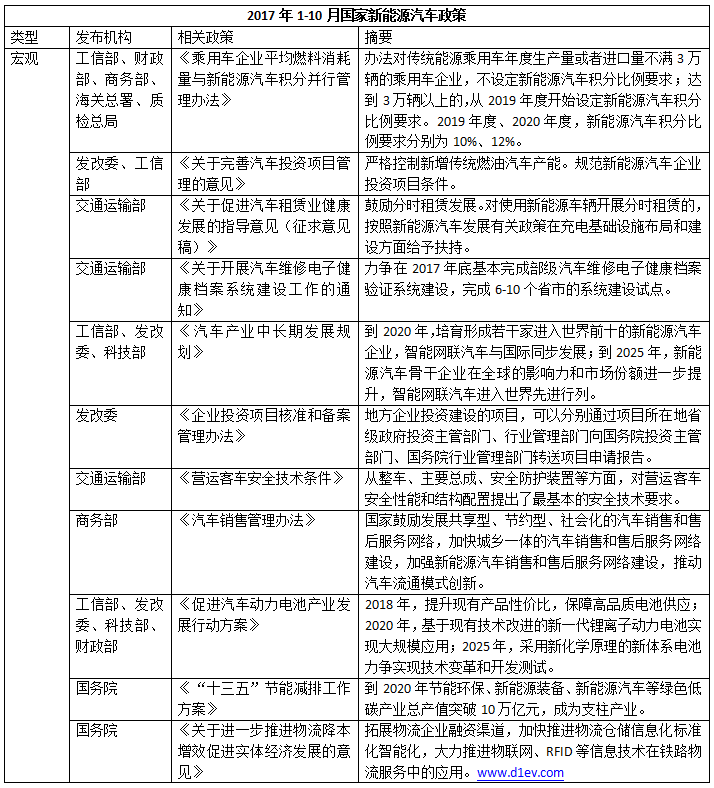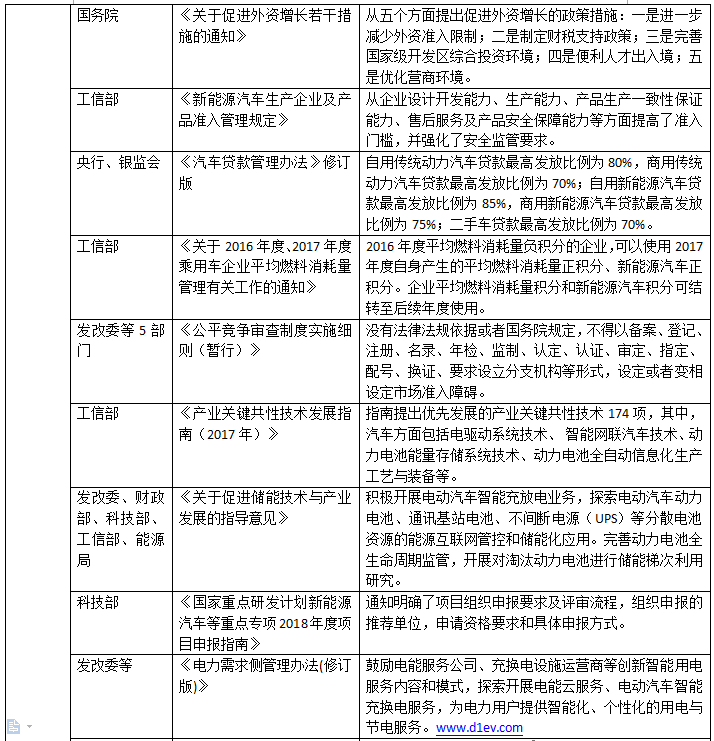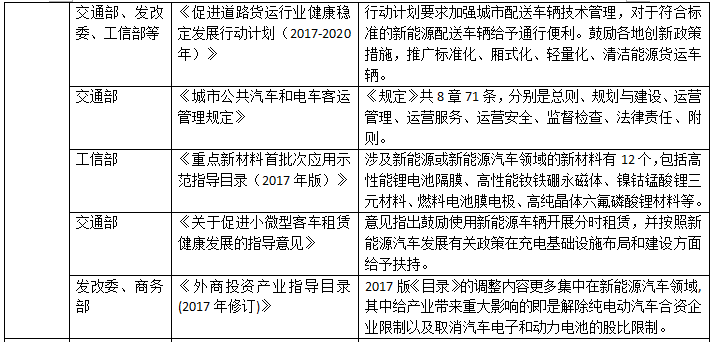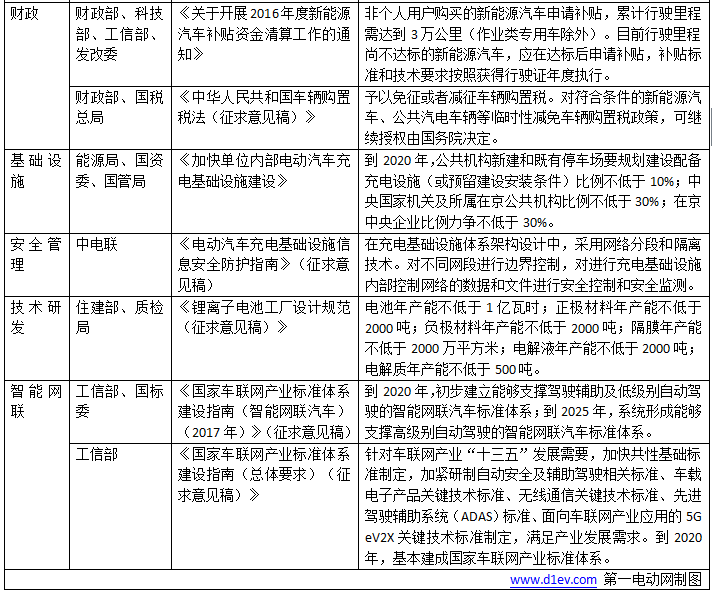From January to October 2017, the country has issued 32 new energy vehicle related policies (including five drafts for solicitation of opinions), involving macros, subsidies, infrastructure, safety management, technology research and development, and smart networking. From the perspective of the ministries and commissions, the Ministry of Industry and Information Technology (MIIT) involved the most policies and reached 10 (2 drafts for soliciting opinions). The NDRC involved 10 projects. The ministries and commissions such as the Ministry of Science and Technology, the Ministry of Transport, the State Council, the Ministry of Commerce, and the Energy Bureau all issued relevant policies. In the 32 national policies for new energy vehicles, the “Measures for the Concurrent Management of the Average Fuel Consumption of New Passenger Vehicles and New Energy Vehicle Integration†is the most important policy in 2017, which determines the new pattern of the Chinese automobile industry in the future. Fuel vehicles or new energy vehicles will enter an era of unprecedented integration, and the big rivers will do their best to make waves. New status will be formed. Fu Yuwu, chairman of the China Association of Automotive Engineers, said that the key words behind the new double-integration policy include energy conservation and emission reduction, solving environmental and energy problems, and solving traffic congestion. The double-integration policy undoubtedly shows the future direction of China's auto industry. This policy is not only a challenge to China's own brands, but also to multinational companies that already possess solid strength. The authority of the Ministry of Industry and Information Technology has interpreted the impact of the implementation of the double-integration policy: the implementation of the double-integration policy can promote the coordinated development of energy-saving and new energy vehicles. Driven by the fuel consumption integral and compliance, the penetration rate of various energy-saving technologies is continuously rising to reduce the fuel consumption of bicycles. Only considering meeting the requirements for the assessment of new energy points, the industry can accumulatively produce up to 3.8 million new energy passenger vehicles by 2020. The steady development of new energy commercial vehicles can realize the planning target of 5 million new energy vehicles in the industry. Under the policy requirements, the coordinated development of traditional energy and new energy vehicles can achieve the target of 5.0L/100km industrial fuel consumption by 2020; during the implementation of the 2018-2020 policy, it is expected to reduce CO2 emissions by 60 million tons cumulatively. The "Regulations on the Management of New Energy Vehicle Production Enterprises and Product Access" has raised the barriers to entry from the aspects of enterprise design and development capability, production capacity, consistency in product production assurance, after-sales service and product safety assurance capabilities, and strengthened safety regulatory requirements. . The "Regulations" emphasizes that the Ministry of Industry and Information Technology shall not accept or grant access to the relevant circumstances or provide false materials to apply for the entry of new energy automobile production enterprises and new energy automotive products, and give a warning. The applicant shall be within one year. Do not apply for admission again. Where access to new energy automobile production enterprises and new energy automobile products is obtained through improper means such as fraud or bribery, the Ministry of Industry and Information Technology shall cancel its new energy automobile production enterprises and product access, and the applicant may not apply again within three years. Into. The "Mid-term and Long-term Development Plan for the Automotive Industry" points the way for the development of the automobile industry in the next 10 years, defines the tasks, and provides guarantees. It is of great significance to speed up the transformation and upgrading of China's automobile industry, cultivate new momentum, and develop a new economy. The overall goal of "strive for continuous efforts for ten years and enter the ranks of the world's automobile powers" has been established. It is proposed that new energy vehicles and intelligent network-linked vehicles should be used as breakthroughs to accelerate cross-border integration, build a new industrial ecosystem, drive industrial transformation and upgrading, and realize development from large to strong. The phased goal in the field of new energy is that by 2020, the annual production and sales of new energy vehicles will reach 2 million units, and the specific power of battery cells will reach 300 watt-hour/kg or more, and they will strive to achieve 350 watt-hour/kg. It reached 260 watt-hours/kg and the cost dropped below 1 yuan/Wh. By 2025, new energy vehicles will account for more than 20% of automobile production and sales, and the power battery system will have a specific energy of 350 Wh/kg. The "Administrative Measures on the Approval and Filing of Enterprise Investment Projects" is an amendment to the "Measures for the Administration of Government-approved Investment Projects" (NDRC Order No. 11), which supplements the contents of the record management and forms the "Enterprise Investment Project Approval." And the "Administrative Measures for Record Filing", at the same time annuling the "Administrative Measures for Government-approved Investment Projects." The application for the qualification of a new pure electric passenger car will be reported according to this management method. At present, 15 newly-built projects for pure electric passenger cars have been approved by the National Development and Reform Commission, and only four companies have truly obtained qualifications for the construction of new electric passenger cars. The "Foreign Investment Industry Guidance Catalogue (Revised in 2017)", specific to the automobile industry, is more focused on the new energy vehicle sector. The major impact on the industry is the lifting of the restrictions on the joint venture of pure electric vehicles and the cancellation of automobiles. Electronic and power battery ratio limitations. Taking Volkswagen as an example, Volkswagen currently has two FAW-Volkswagen and SAIC-Volkswagen joint ventures in China. In addition, Volkswagen and JAC have established a third joint venture of new energy vehicles covering R&D, production, and sales. It is expected to become China's first joint venture to obtain new energy vehicle production qualifications. The introduction of the "Guiding Opinions on Promoting the Healthy Development of Leasing for Small and Mini-Bus Passenger Vehicles" means that the government recognizes the new industry form of "time-share leasing". It is undoubtedly a shot-taker for time-share leasing companies and will play a catalytic role in the development of time-share leasing. Overall, the "Guidance Opinion" threshold is not high, operating companies generally take a positive attitude, and said that it will be conducive to the healthy development of time-sharing leasing industry. Policy factors will not have a big impact on the market in the short term, and benign effects will gradually be released. In addition, the purchase tax for new energy vehicles will soon expire at the end of 2017. In 2018, there is still a great possibility to continue to implement preferential policies for new energy vehicles to ensure that the state supports no shifts. In order to achieve the goal of assisting government departments in helping the superior, the new energy vehicles that enjoy preferential taxation policies will also increase the technical threshold. Aluminum Parts,High Quality Aluminum Parts,Aluminum Cnc Lathe Machine Parts,Precision Cnc Machining Aluminum Parts Huaying Chuang Precision Machinery Co., Ltd. , https://www.hycmetal.com


